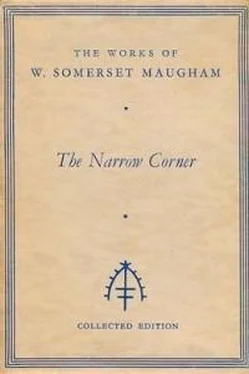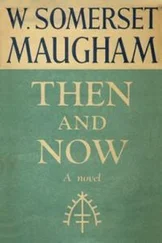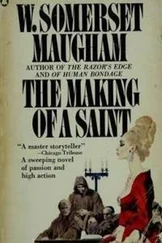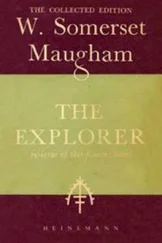He was aroused at last by a voice on the steps, and going out he found there a messenger from Kim Ching, who asked him to go and see him. The doctor had paid his patient a professional visit that morning, and there was nothing much more he could do for him, but he put on his clothes and sallied forth. Kim Ching had heard of the lugger’s arrival, and was curious to know what the strangers wanted. He had been told that the doctor had spent an hour with them that morning. He did not much care for unknown persons to come to the island, so much of which belonged to him. Captain Nichols had sent a message asking to see him, but the Chinese had replied that he was too sick to receive anyone. The captain claimed acquaintance with him, but Kim Ching had no recollection of him. An accurate description of the man had already reached him, and the doctor’s account added nothing to help him. It appeared that they were staying two or three days.
“They told me they were sailing at dawn,” said Dr. Saunders. He reflected for a moment. “Perhaps they changed their plans when I told them there was no cable or wireless on the island.”
“They’ve got nothing in the lugger but ballast,” said Kim Ching. “Stones.”
“No cargo at all?”
“Nothing.”
“Opium?”
Kim Ching shook his head. The doctor smiled.
“Perhaps it’s just a pleasure trip. The skipper’s got stomach trouble. He wants me to do something for him.”
Kim Ching gave an exclamation. That gave him the clue. He remembered. He had had Captain Nichols on one of his schooners, eight or ten years before, and had fired him. There had been some dispute, but Kim Ching did not go into any detail.
“He’s a bad man,” said Kim Ching. “I could have had him put in prison.”
Dr. Saunders guessed that the transaction, whatever it was, had been far from straight, and it might well be that Captain Nichols, knowing Kim Ching would not venture to prosecute, had taken more than his fair share of the profits. There was an ugly look in the Chinaman’s face. He knew all about Captain Nichols now. He had lost his certificate, there had been some trouble with an insurance company, and since then he had been glad to take employment with owners who were not particular about such things. He had been a heavy drinker till his stomach went back on him. He picked up a living as best he could. He was often on the beach. But he was a first–rate seaman, and he got jobs. He did not keep them long, because it was impossible for him to go straight.
“You tell him he more better get out of here pletty damn quick,” said Kim Ching, to finish, breaking into English.
NIGHT had fallen when Dr. Saunders sauntered down once more to Kim Ching’s store. Nichols and Blake were sitting there drinking beer. He took them up to the rest–house. The sailor was full of small talk, of a facetious nature, but Fred remained sullen and silent. Dr. Saunders was conscious that he came against his will. When he entered the living–room of the bungalow he gave a quick, suspicious look round as though he awaited he did not quite know what, and when the house ghekko gave its sudden harsh cry he started suddenly.
“It’s only a lizard,” said Dr. Saunders.
“It made me jump.”
Dr. Saunders called Ah Kay, his boy, and told him to bring the whisky and some glasses.
“I daren’t drink it,” said the skipper. “It’s poison to me. How would you like never to be able to eat a thing or drink a thing, without knowin’ you was goin’ to suffer for it?”
“Let me see what I can do for you,” said Dr. Saunders.
He went to his medicine chest and mixed something in a glass. He gave it to the captain and told him to swallow it.
“Maybe that’ll help you to eat your dinner in comfort.”
He poured out whisky for himself and Fred Blake and turned on the gramophone. The young man listened to the record and his expression grew more alert; when it was finished he put on another himself and, slightly swaying to the rhythm, stood looking at the instrument. He stole one or two glances at the doctor, but the doctor pretended not to notice him. Captain Nichols, his shifty eyes never still, carried on the conversation. It consisted chiefly of enquiries about this man and that in Fu–chou, Shanghai and Hong–Kong, and descriptions of the drunken parties he had been on in those parts. Ah Kay brought in the dinner and they sat down.
“I enjoy my food,” said the captain. “Not fallals, mind you. I like it good and I like it simple. Not a big eater. I never been that. A cut off the joint and a couple of veges, with a bit of cheese to finish up with, and I’m satisfied. You couldn’t eat anything simpler than that, could you? And then twenty minutes after—as regular as clockwork—agony. I tell you life ain’t worth livin’ when you suffer like what I do. D’you ever know old George Vaughan? One of the best. He was on one of the Jardine boats, used to go up to Amoy, he ’ad dyspepsia so bad he ’anged himself. I shouldn’t be surprised if I didn’t, too, one of these days.”
Ah Kay was not a bad cook, and Fred Blake did full justice to the dinner.
“This is a treat after what we’ve had to eat on the lugger.”
“Most of it comes out of a tin, but the boy flavours it up. The Chinese are natural–born cooks.”
“It’s the best dinner I’ve had for five weeks.”
Dr. Saunders remembered that they had said they had come from Thursday Island. With the fine weather they admitted that could not have taken them more than a week.
“What sort of a place is Thursday Island?” he asked.
It was the captain who answered.
“Hell of a place. Nothin’ but goats. The wind blows six months one way and then it blows six months the other. Gets on your nerves.”
Captain Nichols spoke with a twinkle in his eyes as though he saw what was at the back of the doctor’s simple question and was amused at the easy way he tackled it.
“Do you live there?” Dr. Saunders asked the young man, a guileless smile on his lips.
“No, Brisbane,” he answered abruptly.
“Fred’s got a bit of capital,” said Captain Nichols, “and ’e thought he’d like to ’ave a look–see on the chance ’e might find somethin’ in these parts ’e’d like to invest it in. My idea, that was. You see, I know all these islands inside out, and what I say is, there’s a rare lot of chances for a young fellow with a bit of capital. That’s what I’d do if I ’ad a bit of capital, buy a plantation in one of these islands.”
“Do a bit of pearl fishing, too,” said Blake.
“You can get all the labour you want. Native labour’s the only thing. Then you sit back and let other people work for you. Fine life, too. Grand thing for a young fellow.”
The skipper’s shifty eyes, for a moment still, were fixed on Dr. Saunders’ bland face, and it was not hard to see that he was watching the effect of what he was saying. The doctor felt that they had concocted the story between them that afternoon. And when the skipper saw that Dr. Saunders did not swallow it, he grinned cheerfully. It was as if he took so much delight in lying that it would have spoilt it for him if you had accepted it as the truth.
“That’s why we put in ’ere,” he went on. “There’s not much about these islands that old Kim Ching don’t know, and it struck me we might do business with ’im. I told the boy in the store to tell the old fellow I was ’ere.”
“I know. He told me.”
“You seen ’im, then? Did ’e say anythin’ about me?”
“Yes, he said you’d better get out of here pretty damn quick.”
“Why, what’s ’e got against me?”
“He didn’t say.”
“We ’ad a bit of a disagreement, I know that, but that was donkey’s years ago. There’s no sense in ’oldin’ a thing up against a fellow all that while. Forgive and forget, I say.”
Читать дальше
Конец ознакомительного отрывка
Купить книгу










